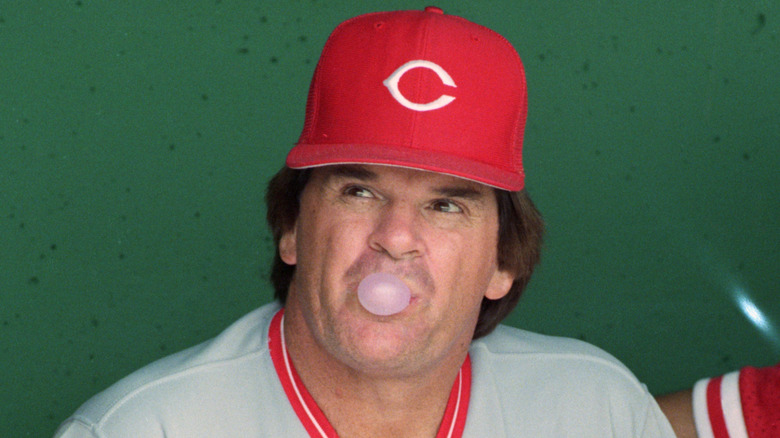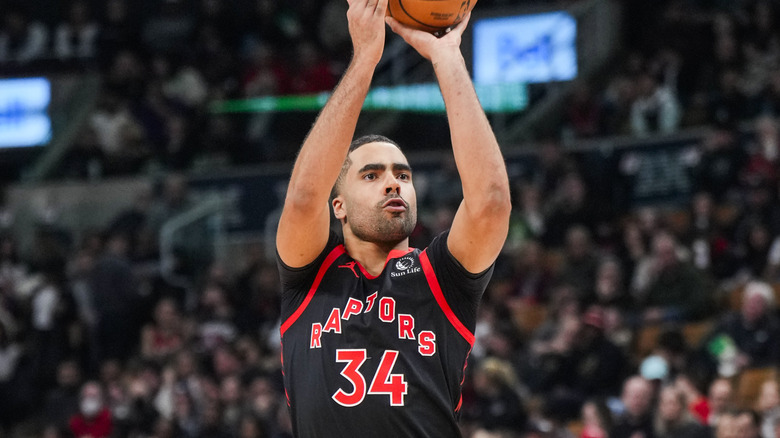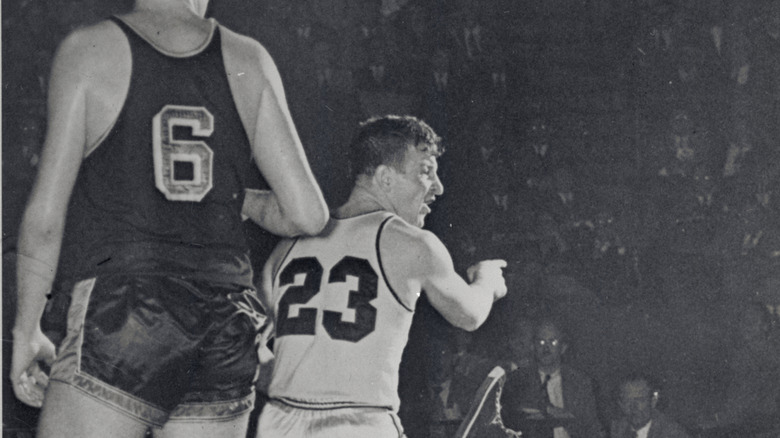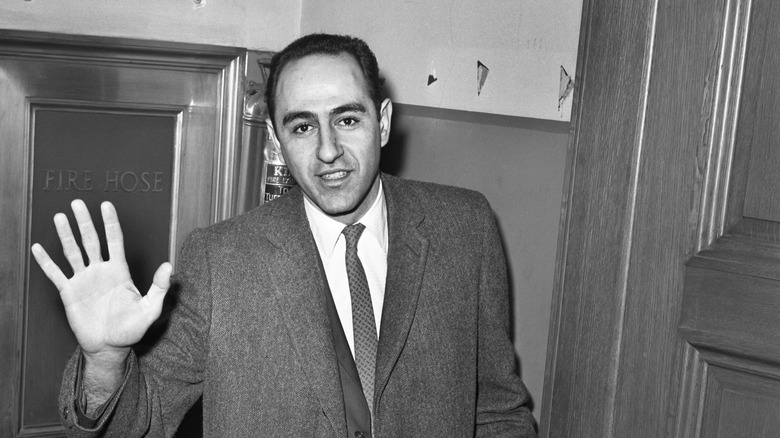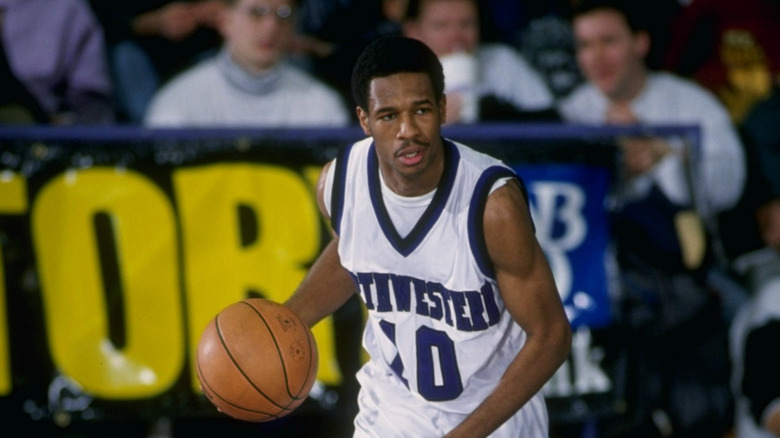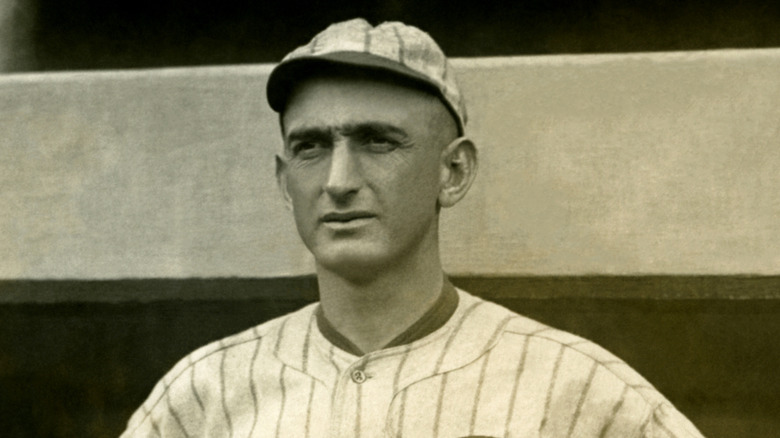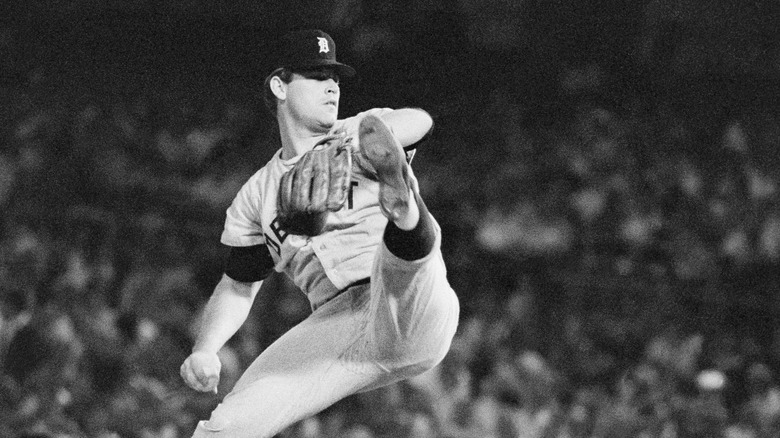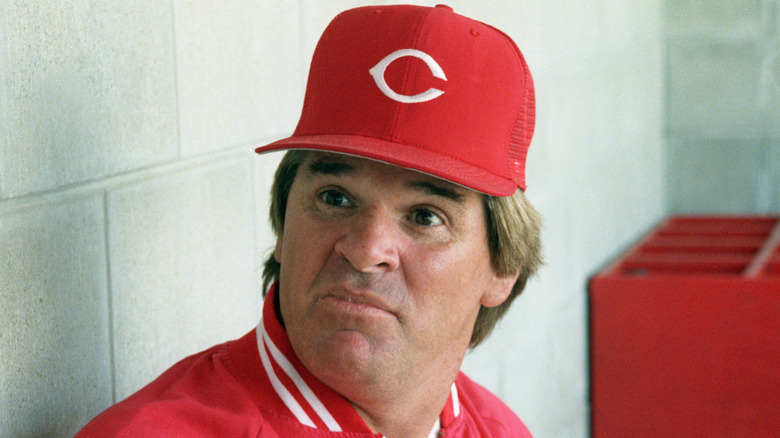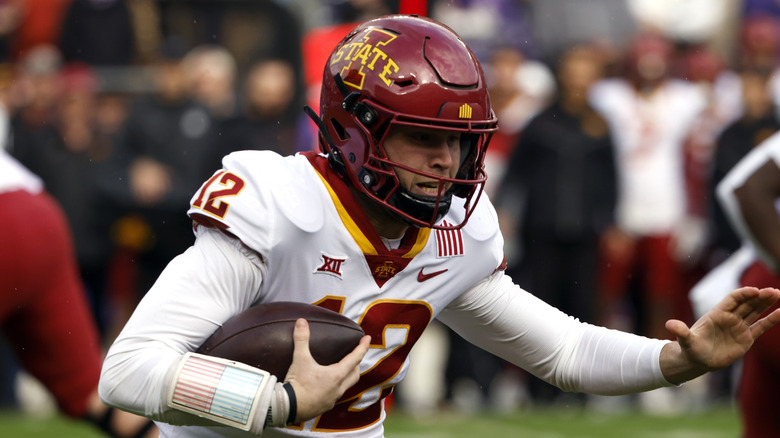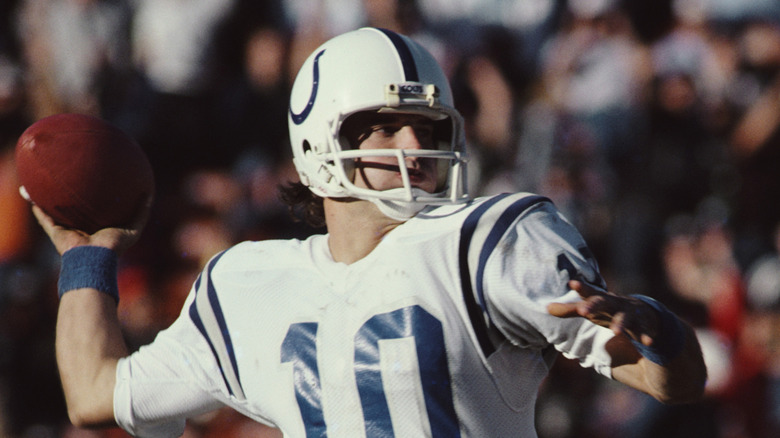Athletes Who Ruined Their Careers Gambling
Professional sports can be incredibly lucrative for all parties involved. Team owners, facilities operators, and organizations all stand to make billions off of the real-life drama of athletic competition. And that's to say nothing of how stars in their sports can become multi-millionaires in short order. Yes, sports are big business in and of themselves, so big that they inspire tertiary industries, notably sports gambling and betting.
Until recently, wagering on the outcome of games and matches was a moral grey area, and in some circles it still is. Online bookmakers and the mainstreaming of gambling have curbed the stigma for the common folk, for the most part. But it's considered unethical and a major conflict of interest for those actively involved in sports to be involved with gambling, as it could lead to allegations of rigging. It can also be shockingly easy for athletes to lose all their money, and one way to do it quickly is through placing some foul bets.
Throughout the past century, many athletes embroiled themselves in gambling scandals, permanently damaging their credibility and reputations. Once caught, they were ostracized from the sport upon which they'd built their lives and where they were among the lucky few who had ever advanced to such a high level. Here are some athletes who were at the literal top of their game when their gambling habits, or links to gambling rings, were exposed.
Jontay Porter
Nothing less than a phenom, forward Jontay Porter was playing in the NBA before his 22nd birthday. One of the most sought-after high school recruits in the country, Porter played just one year of college ball for the University of Missouri before he opted to declare himself ready for the pros. Porter then fizzled out in the NBA. He averaged two points in 11 games with the Memphis Grizzlies in the 2020-21 season and then resurfaced with the Toronto Raptors for a 26-game, 4.4-points-per-game stint in the 2023-2024 campaign.
In April 2024, the NBA announced that it had completed its investigation into Porter's gambling activities. On March 20, before he played in a Raptors game, he'd allegedly given a known sports betting figure information about his health that could have impacted his performance. With insider foreknowledge that the forward wouldn't score as much, another gambler that Porter knew then placed an $80,000 parlay bet, with a potential payout of $1.1 million. During the game, Porter claimed illness and benched himself after playing for three minutes.
The gamblers would've won the bet that Porter allegedly set up, except that there was so much odd activity surrounding the game that the sportsbook canceled it. Porter had also used an online gambling account in another person's name to bet on 13 NBA games in 2024. Porter was banned from being an NBA player and was later charged with a felony for his actions. As of this writing, he could wind up being an athlete who has served jail time.
Gene Melchiorre
In the early 1950s, Gene Melchiorre became the most distinguished player to ever emerge from the Bradley University basketball program. The 5-foot, 8-inch point guard guided his squad to the 1950 championship games of the NIT and NCAA tournaments with his ability to draw fouls and escape defenders to intrepidly pull off shots. Named to two All-American lists of the best college players in the country, Melchiorre graduated in 1951 and subsequently became the No. 1 pick in that year's NBA draft when he was selected by the Baltimore Bullets. Unfortunately, he could be considered an NBA top draft pick who completely flopped, as he was banned from play just after the event and never played a minute in the league.
In January 1951, three bookmakers were arrested and charged with bribery and conspiracy, allegedly over making illegal buy-offs to affect the outcome of a sporting event. Also arrested: Henry Poppe and Jack Byrnes, who had apparently worked with the trio as early as 1949 and been paid thousands to make sure that their basketball team from Manhattan College would lose games to three other schools. An investigation ensnared a total of 32 players and seven college basketball teams, including Melchiorre and Bradley University. In July 1951, Melchiorre confessed to taking bribes to keep the score at a certain level in 1951 games against St. Joseph's and Oregon State. He entered a guilty plea to a misdemeanor, but his sentence was suspended.
Jack Molinas
In the 1952-1953 college basketball season, small forward and captain Jack Molinas was a major reason why Columbia won an Ivy League title. Across his three years at the prestigious school, where the All-American trained to be a lawyer, he averaged 17.7 points and 16.3 rebounds per game. Post-college, Molinas immediately flourished in the NBA. Drafted by the NBA's Fort Wayne Pistons as the fourth overall pick in the 1953 draft, the small forward averaged nearly 12 points a game and was named to the 1954 All-Star team as a rookie. But after 32 games, his season came to an abrupt end with a suspension for betting on his own team's games that extended through the entire 1954-1955 season. That marked Molinas' last connection with the NBA.
However, Molinas remained in the college basketball orbit — as the head of a game-fixing ring. With associates that included two Mafia higher-ups, he contacted players at 27 colleges between 1957 and 1961. By way of payoffs, he ultimately persuaded 476 players to perform a certain way in 43 games to create hospitable betting conditions. In 1961, 37 players from 22 colleges were arrested, and in 1963, Molinas was sentenced to a 1- to 15-year prison sentence, although he was paroled after five years behind bars. In 1975, he was shot to death in the backyard of his Hollywood Hills home in the middle of the night. He was 43.
Kenneth 'Dion' Lee
The 1994-95 season was a dismal one for the Northwestern University basketball team. It finished with a 5-22 record, last place in the Big Ten conference. But it was still a major program, and along with Geno Carlisle landing in the NBA, guard Kenneth "Dion" Lee put up good numbers. He averaged 12 points and 3.7 rebounds per game, and that was with him holding himself back and missing a stretch of the season.
In December 1994, the Northwestern athletic program accused Lee of gambling violations. Lee proclaimed innocence, but when phone records of his correspondence with alleged bookmaker Brian Ballarini surfaced, he admitted to betting on pro and college football games. He received the NCAA's maximum penalty for gambling rule violations at the time: A six-game suspension. Just after that ended, Lee again got involved with a gambling operation and again got caught. In February and March 1995, Lee received $2,000 to appease bettors and, with the assistance of other players in on the scheme, keep the score down in multiple games. That's illegal, and for the crime, Lee served a one-month prison term and two years of probation.
The 1919 Chicago White Sox
After dominating the American League, the Chicago White Sox were widely expected to beat the Cincinnati Reds in the 1919 World Series. But the Reds won, due to a tragedy that changed the MLB forever: Eight members of the White Sox conspired to lose on purpose. They'd heard tell that some members of the Chicago Cubs had received $10,000 to throw the 1918 World Series. The White Sox told ex-player and gambling figure "Sleepy" Bill Burns and his partner, Billy Maharg, that they'd be willing to let the Reds win for the same price. Burns and Maharg lacked the funds, so they got organized crime figure Arnold Rothstein involved. With some small payments issued, the White Sox lost games one, two, four, and five. At that point, only Cicotte had been paid in full, and the irritated White Sox rallied to win games six and seven. Rothstein's hand was forced, he forked over some cash, and the White Sox blew game eight, ending the World Series.
After Chicago Cubs executives got word about players' plans to rig a game, it led to an investigation into baseball corruption, which exposed the sham 1919 World Series. The eight fix participants were acquitted of conspiracy charges, but MLB commissioner Kenesaw Mountain Landis delivered lifetime baseball bans. And in the end, it wasn't worth the money. World Series champions make a lot of money today, but they didn't in 1919. A White Sox victory would've resulted in $5,200 bonuses. Except for Cicotte, the indicted players got about $5,000 each.
Denny McClain
One of the most spectacular and dominant Major League Baseball pitchers of the 1960s, the Detroit Tigers' Denny McClain was a tough opponent for batters. He was already an all-star and an MVP candidate by 1968, when he amassed a 31-6 record with 280 strikeouts. That garnered McClain an American League MVP trophy and a Cy Young Award. He'd win the latter again the next season for a 24-9 record with a league-leading nine shutouts. Then, after the 1972 season, McClain was completely out of the majors.
In 1970, an investigative report in "Sports Illustrated" alleged that McClain had been party to a betting operation for three years. The pitcher and professional organist played a gig at the Shorthorn Steak House in Flint, Michigan, where he became acquainted with bookie Jigs Gazell, linked to the local Syrian-American organized crime syndicate that was tight with the Italian mafia. The arrangement was such that McClain would foot the bill for large winning bets placed by other gamblers, but that went awry after the pitcher refused to fork over the cash on a $46,600 horse racing wager. A mob enforcer named Tony Giacalone then reportedly stomped on and dislocated multiple toes in McClain's foot, impairing his ability to pitch well during the 1967 pennant race. After that news broke ahead of the 1970 season, McClain was suspended for 90 days for bookmaking, just after he filed for bankruptcy, citing debts of $446,070 he couldn't pay back.
Pete Rose
It's certainly one of the Baseball Hall of Fame's biggest controversies ever that Pete Rose has never been inducted. On paper, the energetic and aggressive Rose, nicknamed "Charlie Hustle," is among baseball's greatest, playing 24 seasons that included 17 All-Star appearances, three World Series championships, three batting titles, MVP and Rookie of the Year honors, and 4,256 hits — an all-time record.
In 1986, Rose became a player-manager for the Cincinnati Reds, the team with which he'd spent the vast majority of his career. In 1989, with Rose entrenched as a manager only, a Sports Illustrated reporter told Major League Baseball commissioner Peter Ueberroth that a bookmaker told them that the icon had bet on baseball games. In a meeting with MLB's top brass, Rose admitted to wagering on other sports, but never his own. The league hired an investigator, who discovered evidence that Rose had often been in debt, including owing large sums to Mafia-connected figures. The published report also alleged that Rose had bet on Cincinnati Reds games while he was the team's manager. When confronted with that information, Rose allowed the league to initially ban him from baseball, effective immediately, but that he could apply to return at a later date. He was never reinstated, not even after finally admitting to and apologizing for gambling in 2010. Rose died in 2024.
Tucipita Marcano
At almost 17 years old, Venezuela-born Tucupita Marcano signed with the San Diego Padres. After working his way up through the minors, the versatile utility infielder and light hitter joined the roster of the Padres in 2021 and was then sent to play parts of two seasons with the Pittsburgh Pirates, all the while generating a moderate number of hits and base appearances.
In June 2024, Major League Baseball issued a lifetime ban against Marcano for violating rules covering gambling. In 2022 and 2023, the league discovered, he had placed 387 wagers, of which 231 concerned MLB games. His bets totaled $150,000, of which $87,000 involved baseball. Marcano wasn't a very successful gambler, however, as he won only 4.3% of the time. When he received his permanent exclusion order from baseball, four additional players were suspended for gambling: Michael Kelly, Andrew Saalfrank, Jay Groome, and Jose Rodriguez. Their one-year suspensions were for betting on teams and games with which they weren't associated. Marcano's punishment was so severe because he bet against his own team, the Pirates, albeit while he was injured and unable to play.
Iowa and Iowa State football players
After two years as a backup, Hunter Dekkers joined the Iowa State Cyclones football squad as a starting quarterback in the 2022 season. He led the Big 12 conference in attempts and completions (457 and 302, respectively) and scored 19 touchdowns. Dekkers was the star of Iowa State's football program — and also one of over a dozen athletes from that school and rival University of Iowa connected to an illegal sports betting operation.
Between 2021 and 2023, which covered a time in which he wasn't yet 21, Dekkers used an online account in his mother's name to place 366 bets, of which 26 were on ISU games, including one football game in which he didn't participate. He was fined $645 after agreeing to a plea deal that included entering a guilty plea to an underage gambling charge, and after being stripped of his ability to play at an NCAA school, he transferred to the unaffiliated junior college Iowa Western Community College.
Art Schlichter
Art Schlichter's biography, "Straight Arrow," was published when he was just 21 years old — his achievements and accolades were already that impressive. From 1978 to 1981, he quarterbacked Ohio State's storied football team, throwing 6,584 yards for 44 touchdowns. As a sophomore, the squad went 11-1 under Schlichter, the only loss in the Rose Bowl. Finishing in the top six in the voting for the Heisman Trophy, given to college football's top athlete, Schlichter was drafted by the Baltimore Colts with the No. 4 pick in the 1982 NFL Draft.
The controversies started piling up while Schlichter was still an undergrad. Worried about his future and buckling under pressure, he coped with betting on horse racing and college basketball games. By graduation, he'd fallen into and been rescued from gambling debts twice, for amounts totaling $2,000 and $12,000. Despondent over a 1982 season-delaying players' strike and being named the Colts' third-stringer, Schlichter continued to gamble on college sports, and by early 1983, he'd racked up debts of $400,000. All that violates NFL rules, and he was suspended for the entirety of the 1983 season. After playing mostly as a backup in 13 games over three years, Schlichter was cut by the Colts in 1985. In recent years, the former football star served a prison term for his involvement in a fraudulent ticketing scheme and was arrested for cocaine possession.
Agustin Moyano
The highest Agustin Moyano reached on the global singles rankings was 1,343rd, but that still made him one of the best male tennis players in the world. The Argentina-born athlete won eight tournaments on the worldwide circuit and was particularly skilled on clay courts, where he was victorious five times. But then scandal hit.
In 2014, Belgium-based law student Grigor Sargsyan built a gambling operation that involved match rigging. He went after the low-level, barely ranked professionals because they made the least amount of money, and he figured they could be easily bribed or paid off to throw matches. Within three years, he'd built a base of over 180 players willing to be in on the fix, for a price.
For Moyano and others, Sargsyan would pay $2,000 to $3,000 if they lost a set or match, which is around the same amount they'd get if they won a whole obscure tournament. By 2023, Belgian authorities had foiled the scheme, and Sargsyan was arrested, charged, and sentenced to a five-year prison term. In 2025, the International Tennis Integrity Agency finished doling out punishments to the gambler-paid players. The most egregious offenders received suspensions of two years to five-and-a-half years, but Moyano received the most severe penalty for taking the fall. After claiming innocence and demanding a hearing, he was found guilty — the former star was fined $10,000 and suspended from professional tennis for 15 years.
